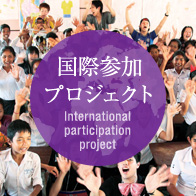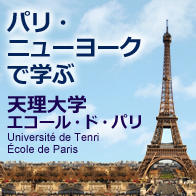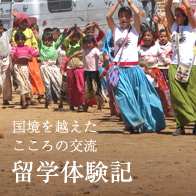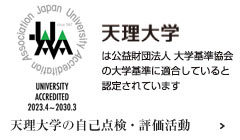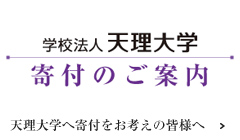カリキュラムポリシー
人間学部
人間学に関する各学科に共通する基礎知識を修得し、年次の進級とともに学科・専攻の専門性を深めていける講義・演習・実習の科目を配置しています。卒業論文・卒業課題研究の作成により各領域における課題を認識し解決する力を修得することができるカリキュラムを編成しています。
The lectures, seminars, and practicum are distributed so that students can acquire basic knowledge common to the departments related to human studies, and study at a deeper and more specialized level as students continue their studies in their departments and majors. Also, the curriculum is organized so that by working on the Graduation Thesis and Graduation Research Project, students can acquire the ability to recognize and resolve issues in various fields.
宗教学科
宗教学と宗教史の基礎的な理論を踏まえながら、仏教、キリスト教、イスラームといった世界の主要な宗教伝統の成立と歴史的展開、思想などを学ぶ科目、天理教の原典や教義、歴史について学び、個々の信仰の涵養と豊かな人格形成につながる科目を体系的に配置しています。
1年次では基礎演習と基礎科目、2年次では発展科目、3年次では研究演習および発展科目を履修することで段階的な理解を深める編成となっています。さらに学修の総まとめとしての卒業論文作成に向けた演習を3年次と4年次に配置したカリキュラムを編成しています。
We systematically distribute subjects that cover the formation of the religious traditions and historic developments of the major religions of the world, such as Buddhism, Christianity, and Islam, based on the fundamental theory of religious studies and religious history. There are also subjects that allow students to learn about the doctrine, teachings, and history of Tenrikyo, in connect to the cultivation of the individual’s faith, and the enrichment of character building.
The classes are organized so that students will gradually deepen their understanding. For instance, during the first year, students study introductory seminars and basic subjects; during the second year, the subjects will become more advanced; and during the third year, students will enroll in research seminars and advanced subjects. Furthermore, during the third and fourth year, the curriculum is organized so that students can take seminars that cover the overall studies, which will prepare them to write their Graduation Thesis.
人間関係学科
人間社会の理解を深める基礎科目と各専攻の専門的な学識を深めるための発展科目を配置しています。少人数制の演習・実習科目を1年次から4年次まで段階的にカリキュラムを編成しています。
The curriculum is arranged with basic subjects to deepen understanding of human society and advancement subjects in each major to deepen specialized knowledge. The curriculum is organized in small-group seminars and practicum in a progressive level from the first year up until the fourth year.
臨床心理専攻
臨床心理学はもとより、心理学の幅広い領域に関する学識を修得するための講義科目と実践スキルを養うための演習・実習科目を体系的に配置しています。
1年次では入門演習、2年次では基礎科目および発展科目、3年次では発展科目および実習科目を履修する編成となっています。さらに学修の総まとめとしての卒業課題研究作成に向けた演習を3年次と4年次に配置したカリキュラムを編成しています。
また、公認心理師(国家資格)受験資格に必要な科目を配置するとともに、臨床心理士(公財 日本臨床心理士資格認定協会)の資格取得に接続する知識とスキルを修得しうるカリキュラムを提供しています。
In addition to clinical psychology, lectures to learn about psychology on a wide range, and seminars and practicum to cultivate practical skills are systematically arranged.
The classes are organized so that students can enroll in introductory seminars during their first year, basic subjects and advanced subjects in their second year, advanced subjects and training subjects in their third year. Further, during the third and fourth year, the curriculum is organized so that students can take seminars that cover the overall studies, Ih will prepare them to write their Graduation Thesis.
Also, classes are arranged so that students can earn credits Ih will qualify them to take the examination to become a licensed psychologist (national qualification). The curriculum also offers classes that allow students to acquire knowledge and skills to qualify as a clinical psychologist (Foundation of the Japanese Certification Board for Clinical Psychologists).
生涯教育専攻
生涯学習の意義を理解し生涯学習支援に資する専門的知識・技術に関する科目を体系的に配置しています。
1年次では基礎演習、2年次では基礎実習および基礎科目、3年次では発展科目を履修する編成となっています。さらに学修の総まとめとしての卒業論文作成に向けた演習を3年次と4年次に配置したカリキュラムを編成しています。
また、地域社会や諸学校・行政と積極的に連携して社会教育の実務や地域連携に携わる実習科目を設け、4年間を通じて多様な学びの場に触れながら同時に生涯学習支援の専門的職業能力を身につけることができるカリキュラムを提供しています。
1年次では基礎演習、2年次では基礎実習および基礎科目、3年次では発展科目を履修する編成となっています。さらに学修の総まとめとしての卒業論文作成に向けた演習を3年次と4年次に配置したカリキュラムを編成しています。
また、地域社会や諸学校・行政と積極的に連携して社会教育の実務や地域連携に携わる実習科目を設け、4年間を通じて多様な学びの場に触れながら同時に生涯学習支援の専門的職業能力を身につけることができるカリキュラムを提供しています。
We systematically distribute subjects that allow students to understand the significance of lifelong education, and offers classes that are related to specialized knowledge and skills Ih contribute to supporting lifelong education.
The classes are organized so that students can enroll in introductory seminars during their first year, basic training and basic subjects in their second year, advanced subjects and training subjects in their third year. Further, during the third and fourth year, the curriculum is organized so that students can take seminars that cover the overall studies, Ih will prepare them to write their Graduation Thesis.
The curriculum also offers classes that allow students to bring up professional vocational abilities of lifelong learning support while touching various learning places throughout four years by setting the practical courses involving practical social education practices and community collaboration in actively cooperation with local communities, schools and administrations.
社会福祉専攻
社会福祉および関連諸領域の理論や方法、制度などを学ぶ講義科目をはじめ、具体的な実践方法を学ぶ演習・実習科目を体系的に配置しています。
1年次と2年次では基礎演習と基礎科目、3年次では発展科目および実習科目を履修する編成となっています。さらに学修の総まとめとしての卒業論文作成に向けた演習を3年次と4年次に配置したカリキュラムを編成しています。
また、社会福祉士(国家資格)と精神保健福祉士(国家資格)の受験資格を得るためのカリキュラムを提供しています。
We systematically distributes subjects that allow students to start out with lectures that teach social welfare, along with theories and methods related to it, then advances to seminars and practicum to learn specific practical methods.
The classes are organized so that students can enroll in introductory seminars and basic subjects during the first and second years, and advanced subjects and training subjects during the third year. Further, during the third and fourth year, the curriculum is organized so that students can take seminars that cover the overall studies, which will prepare them to write their Graduation Thesis.
Also, we offer the curriculums that prepare students to take qualification examinations to become a social worker (national qualification) and psychiatric social worker (national qualification).
